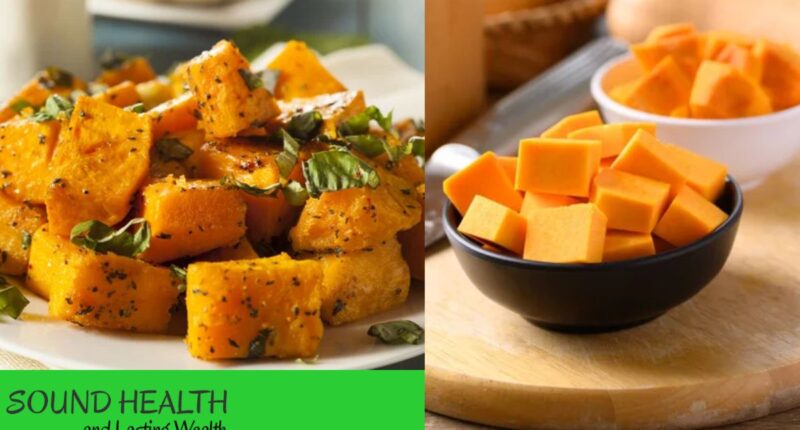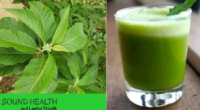Yes, butternut squash is a healthy and nutritious vegetable to eat and be enjoyed by people of all ages. It is a type of winter squash that is packed with nutrients. It is a good source of vitamins A, C, and E, as well as potassium, magnesium, and fiber. Butternut squash is also low in calories and fat, making it a healthy addition to any diet.
Here are some of the health benefits of eating butternut squash:
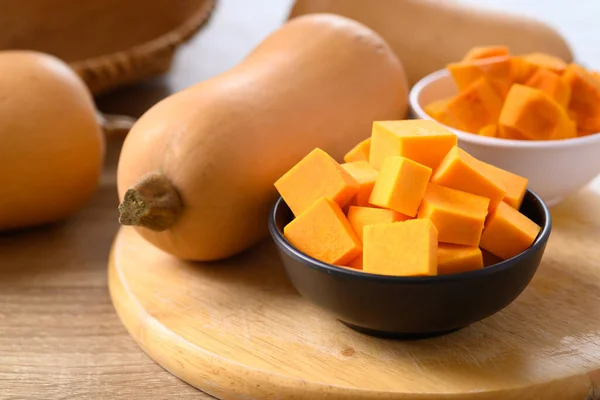
1. High in vitamins and minerals.
Butternut squash is a good source of vitamins A, C, E, and B6, as well as potassium, magnesium, and manganese. These nutrients are important for a variety of bodily functions, including vision, immunity, blood pressure regulation, and energy production.
2. Low in calories and fat
According to the United States Department of Agriculture (USDA), one cup of cooked butternut squash contains only about 82 calories and 2 grams of fat. This makes it a healthy choice for people who are trying to lose weight or watch their calorie intake.
3. Promotes healthy vision
Thanks to its rich vitamin A content, butternut squash plays a crucial role in maintaining healthy vision. Vitamin A is a precursor to retinol, a compound necessary for good eyesight. Regular consumption of butternut squash can help prevent age-related macular degeneration, cataracts, and other eye conditions.
4. Boosts Immune function
Butternut squash is a valuable addition to your diet when it comes to boosting immune function. The combination of vitamins A and C, along with other antioxidants present in this vegetable, helps strengthen the immune system. A robust immune system can better defend against infections, viruses, and diseases.
5. Supports digestive health
With its fiber content, butternut squash promotes healthy digestion. Dietary fiber aids in maintaining regular bowel movements and preventing constipation. It also contributes to a healthy gut microbiome by providing nourishment for beneficial bacteria, thus improving overall digestive health.
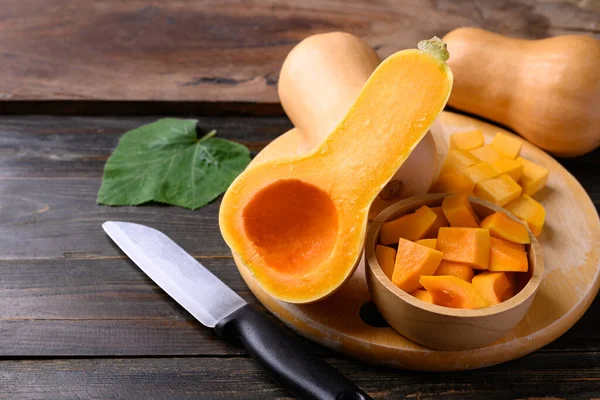
6. Enhances heart health
Including butternut squash in your diet can benefit your heart health. It contains potassium, a mineral that helps regulate blood pressure levels. Potassium works in conjunction with fiber to maintain proper cardiovascular function, reducing the risk of heart disease, stroke, and other cardiovascular conditions.
7. Aids in weight management
For those aiming to manage their weight, butternut squash can be an excellent addition to a balanced diet. It is low in calories and high in fiber, providing a feeling of fullness and reducing the likelihood of overeating. By incorporating this vegetable into your meals, you can support healthy weight loss or maintenance.
8. Provides antioxidant protection
Butternut squash is rich in antioxidants, including beta-carotene and other carotenoids. These compounds help protect the body from oxidative stress caused by harmful free radicals. Antioxidants play a crucial role in reducing the risk of chronic diseases such as cancer, heart disease, and age-related macular degeneration.
9. Supports bone health
Maintaining strong and healthy bones is essential, especially as we age. Butternut squash contains vital nutrients like calcium, magnesium, and vitamin K, which contribute to bone health. Calcium and magnesium help in bone formation and density, while vitamin K supports proper calcium absorption and utilization in the body.
10. Regulates blood sugar levels
For individuals with diabetes or those aiming to manage their blood sugar levels, incorporating butternut squash into their diet can be beneficial. It is a low-glycemic vegetable, meaning it has a minimal impact on blood sugar levels. The fiber content in butternut squash also aids in slowing down the digestion and absorption of carbohydrates, promoting better blood sugar control.
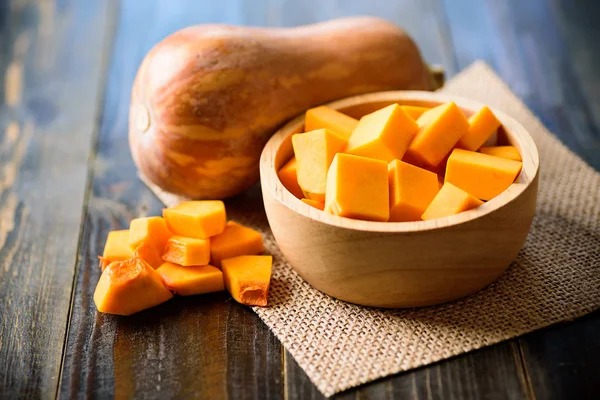
11. Reduces Inflammation
Chronic inflammation is associated with various health problems, including arthritis, heart disease, and certain types of cancer. Butternut squash contains anti-inflammatory compounds such as vitamin C, beta-carotene, and other antioxidants that help reduce inflammation in the body. Including this vegetable in your diet can contribute to overall inflammation reduction.
RELATED: 11 Inflammatory Foods Wreaking Havoc On Your Body
12. Boosts brain function
The nutrients present in butternut squash play a role in maintaining optimal brain function. Vitamin C and other antioxidants protect brain cells from damage caused by oxidative stress. Additionally, the vegetable’s high folate content supports cognitive function and is especially important for pregnant women to aid in fetal brain development. While improving your brain, you should also know that these 7 Everyday Foods Secretly Damage Your Brain
13. Improves skin health
Butternut squash is beneficial for your skin’s health and appearance. The antioxidants in the vegetable help protect the skin from damage caused by free radicals and promote a youthful complexion. The high vitamin A content in butternut squash also aids in maintaining healthy skin by supporting cell turnover and collagen production.
14. Enhances hair health
If you’re looking to improve the health and vitality of your hair, butternut squash can be a valuable addition to your diet. The vitamins A and C, along with other essential nutrients, nourish the hair follicles and promote healthy hair growth. These nutrients also contribute to the overall strength and luster of your hair.
15. High in fiber
Butternut squash is a good source of fiber, which can help to keep you feeling full and satisfied after eating. Fiber can also help to regulate digestion and reduce the risk of constipation.
RELATED: Side Effects of High-Fiber Diet: Understanding the Pros and Cons
16. May help boost mood
Butternut squash is a good source of vitamin B6, which helps to produce serotonin, a neurotransmitter that plays a role in mood. Serotonin is a neurotransmitter that plays a role in improving mood, reducing anxiety, and promoting sleep. Serotonin helps to promote sleep by calming the mind and body.
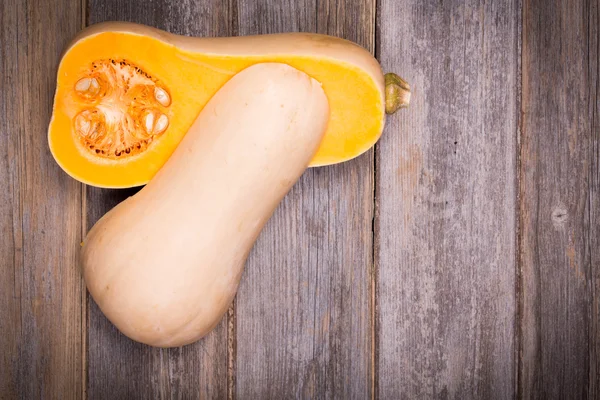
How to eat butternut squash and per serving
Butternut squash can be eaten cooked or raw. It is a versatile vegetable that can be used in a variety of dishes, such as soups, stews, curries, roasted vegetables, and desserts.
How much Butternut squash per serving? A serving of cooked butternut squash is typically 1 cup (200 grams). One medium-sized butternut squash (about 2 pounds) will yield about 4 cups of cooked squash. This means that one butternut squash will provide enough cooked squash for about 4 servings.
Of course, the exact amount of butternut squash per serving will vary depending on the size of the squash and how it is cooked. For example, if you roast the squash, it will shrink slightly and you will get slightly less cooked squash per serving. If you puree the squash, you will get slightly more cooked squash per serving.
Here is a table that shows the approximate amount of cooked butternut squash per serving for different serving sizes:
| Serving size | Cooked butternut squash |
|---|---|
| 1 cup | 200 grams |
| 1/2 cup | 100 grams |
| 1/4 cup | 50 grams |
| 1 ounce | 28 grams |
As you can see, a serving of cooked butternut squash is a relatively small amount. This is because butternut squash is a very dense food and is high in calories and nutrients. So, even though you may not be eating a lot of butternut squash in terms of volume, you are still getting a lot of nutrition from it.
What is the daily recommended Butternut squash to eat?
There is no specific daily recommended amount of butternut squash to eat. However, the Dietary Guidelines for Americans recommend that adults eat at least 2 cups of vegetables per day. A serving of cooked butternut squash is about 1 cup, so you could easily meet your daily vegetable intake by eating 2 servings of butternut squash.
Of course, you can eat more than 2 servings of butternut squash per day if you like. Butternut squash is a healthy and nutritious vegetable, so it is a good choice to add to your diet.
No matter how you choose to eat it, butternut squash is a delicious and healthy way to add more vegetables to your diet.
Recipes with butternut squash
Apart from its numerous health benefits, one of the great things about butternut squash is its versatility in the kitchen. You can use it in a variety of recipes, such as;
- Roasted butternut squash with sage and brown sugar
- Butternut squash soup
- Butternut squash curry
- Butternut squash risotto
- Butternut squash pancakes
Ways to incorporate butternut squash into your diet:
- Add cooked butternut squash to your morning oatmeal or smoothie.
- Add cubed butternut squash to stir-fries or curries.
- Make butternut squash muffins or pancakes.
- Roasting: Roasting is a simple and delicious way to cook butternut squash. Simply cut the squash in half, remove the seeds, and roast it at 400 degrees Fahrenheit for about 30 minutes, or until tender.
- Pureeing: Butternut squash puree can be used in a variety of dishes, such as soups, stews, and smoothies. To make butternut squash puree, simply roast the squash as directed above, then puree it in a blender or food processor until smooth.
- Soup: Butternut squash soup is a hearty and healthy soup that is perfect for a cold winter day. To make butternut squash soup, simply roast the squash as directed above, then add it to a pot with broth, onions, and garlic. Bring the soup to a boil, then simmer for about 20 minutes, or until the squash is tender. Puree the soup until smooth, then season with salt and pepper to taste.
- Curry: Butternut squash curry is a flavorful and exotic dish that is perfect for a special occasion. To make butternut squash curry, simply roast the squash as directed above, then add it to a pot with curry powder, coconut milk, and your favorite vegetables. Bring the curry to a boil, then simmer for about 20 minutes, or until the squash is tender. Serve with rice or naan bread.
- Bake butternut squash with your favorite toppings, such as cinnamon, nutmeg, and brown sugar.
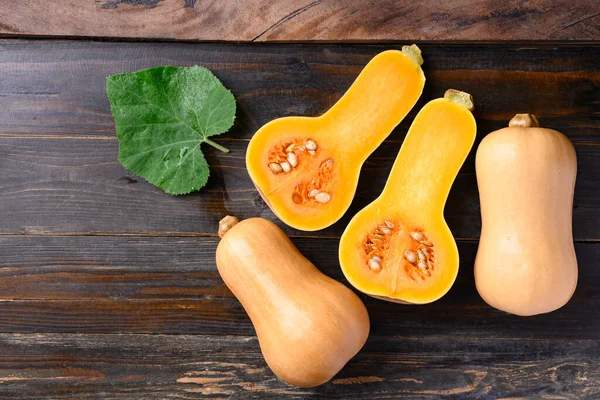
Possible risks of eating butternut squash
Butternut squash is generally safe to eat. However, some people may experience allergic reactions to it. Some people may experience mild side effects such as bloating or gas after eating butternut squash. Additionally, butternut squash contains oxalates, which can bind to calcium in the body and form kidney stones. If you are at risk for kidney stones, you may want to limit your intake of butternut squash and seek medical attention immediately.
Who should avoid eating butternut squash?
Generally, butternut squash is safe for most people to eat. However, there are a few groups of people who may want to avoid or limit their intake of butternut squash:
- People with allergies to cucurbit family vegetables: Butternut squash is a member of the cucurbit family, which also includes cucumbers, melons, and zucchini. If you are allergic to other cucurbit family vegetables, you may also be allergic to butternut squash.
- People with kidney disease: Butternut squash is high in potassium, which can be a problem for people with kidney disease. If you have kidney disease, you should talk to your doctor before eating butternut squash.
- People taking certain medications: Butternut squash can interact with certain medications, such as warfarin (Coumadin). If you are taking any medications, you should talk to your doctor before eating butternut squash.
Alternatives to Using Butternut Squash
If you’re looking for an alternative to butternut squash, there are plenty of other options out there. Here are a few of our favorites:
Pumpkin: A classic fall favorite, pumpkin is rich in vitamins A and C, as well as fiber. Try roasting it, pureeing it into a soup, or using it to make homemade pies or bread.
Acorn squash: Another winter squash with similar nutritional benefits to butternut squash, acorn squash is a great option for roasting, baking, or stuffing.
Spaghetti squash: A lower-carbohydrate alternative to pasta made from wheat flour, spaghetti squash can be used in all sorts of dishes – from simple sauces to more complex casseroles. Give it a try!
Kabocha squash: A type of Japanese pumpkin, kabocha has a sweeter flavor than other varieties of winter squash. It’s delicious roasted, mashed, or used in soups and stews.
FAQS
Q: How much butternut squash should I eat per day? A: There is no set recommended amount of butternut squash to eat per day. However, a good rule of thumb is to aim for at least one cup of cooked butternut squash per day. This amount will provide you with a good dose of the nutrients that butternut squash has to offer.
Q: Is butternut squash suitable for people with diabetes? A: Yes, butternut squash is suitable for people with diabetes. It is a low-calorie, high-fiber food that has a low glycemic index. This means that it slowly releases sugar into the bloodstream, which can help to prevent blood sugar spikes.
Sources:
1. https://www.nutritionix.com/i/usda/butternut-squash-1-cup/58bde3e16b5254571c44ecee
2. https://fdc.nal.usda.gov/fdc-app.html#/food-details/169295/nutrients
3. https://www.ncbi.nlm.nih.gov/pmc/articles/PMC7382094/
4. https://onlinelibrary.wiley.com/doi/abs/10.1002/fsn3.1602
5.https://www.researchgate.net/publication/328048867_Nutritional_Composition_and_Storage_of_Butternut_Squash
